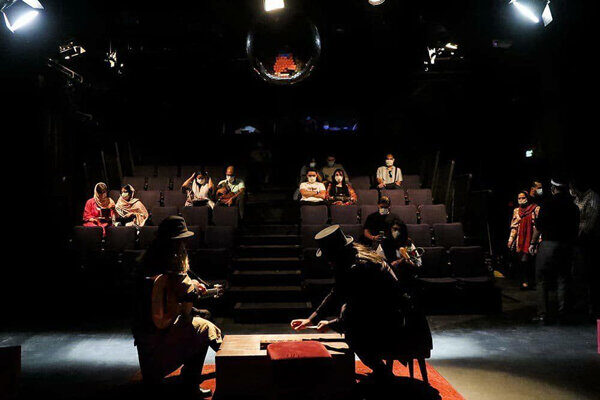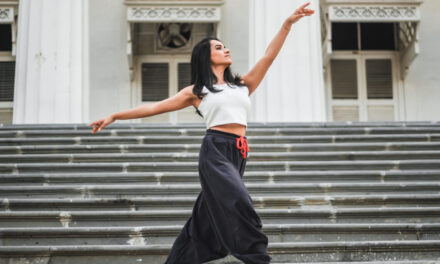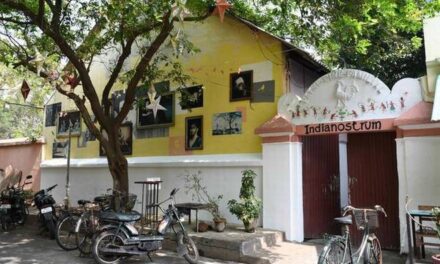After four months of closure, theaters in Iran are able to open because they implemented necessary health protocols to avoid coronavirus spread. They were one of the last businesses to reopen due to their high risk of spreading infection. Many hope the approach could eventually improve their frail economic state, but some directors and artists fear the possible rise of COVID-19 infection among performers.
Iran’s National Headquarters to Fight Coronavirus announced theaters are allowed to sell tickets for half of their seats from June 21, and seven professional theater productions have officially started performing at four theaters in Tehran. It is mandatory for performing art venues to follow disinfecting procedures and provide hand sanitizer, while the audience must maintain social distancing and wear masks and gloves.
Iran’s Dramatic Arts Center started theater activities on June 10 by launching street theater shows titled Me, You, Us, and Theater, Life, Corona for ten nights in five Iranian provinces. Their aim was to raise awareness of the pandemic and to create an uplifting, escapist environment. During this festival, short plays were performed 48 times by 12 theater companies in Tehran City Theater’s outdoor public space, and 139 street theater events were performed in Kerman, Gilan, Qazvin, and Kermanshah provinces. Four theater groups in Kermanshah used puppets and head masks shaped like a coronavirus as they performed 350 times on crosswalks during 90-second red lights.
Director-General of Iran’s Dramatic Arts Center Ghādir Āshina was recently quoted saying that “it would take around a month before theater could return to normal because it’s necessary to disinfectant theaters before and after the show, and during the intermission, and implement social distancing.”
The official also mentioned that Iran’s Dramatic Arts Center had submitted a report to the Ministry of Culture and Islamic Guidance in May, providing an estimated figure for the coronavirus compensation support package the government promised to deliver. The report contained the number of performances and tickets canceled along with the number of performers and artists who have been unemployed since the theaters’ closure on February 22. The delayed compensation has been finally paid but theaters had to survive in the meantime.
The closure of 16 private theaters during lockdown put some of them on the verge of bankruptcy since they are located in rented venues. The company owners

Eleven Wounds of the Soul directed by Farzad Amini is being performed in Tehran Independent Theater. Photo by Shirin Jahanzadeh
had to cancel performers’ contracts and pay staff salaries without any revenue. According to the director of Iranian Theater Association Shāhīn Chigīnī, the losses in Tehran’s private theaters from February 22 to March 19 was 26 billion rials (about $620,000). Even though many performers started live shows on Instagram, and other theater experts and scholars held discussions on various topics, this did not generate much income. Some producers even sold tickets for streaming videos of their plays online, and some artists launched more cohesive online theater festivals. However, revenue has been minimal.
Many artists are solely dependant on their trade and want to get back to work. However, concerns over the safety of performers have created uncertainty around opening theaters because actors would not wear masks. Because of this, Iran’s Dramatic Arts Center added a 60-minute break after each performance in order to disinfect the seats, run air conditioners, and check the audience’s temperatures. They are also required to wear masks and show e-tickets on their phones.
Technical and health requirements for theater companies include installing air conditioners in makeup rooms and using separate makeup applicators for each actor. They must also disinfect the set and costumes after each performance, and be able to refund tickets in the case of an infection in the cast. The center has suggested that performances may be streamed online in some instances, and companies have been encouraged to create pieces that are compatible with social distancing and reduce the number of actors needed in rehearsals at any given time.
Rūhullāh Jafarī, an Iranian director and theater researcher, has said that reopening theaters would have a negative effect and puts people’s health at risk. “There is a need to improve infrastructures, but the Ministry of Culture and Islamic Guidance has not even paid its delayed payment to theater groups,” said the director. “The instructions state that actors have to maintain a one-meter distance between each other on stage and in the dressing rooms, and if an audience member coughs or sneezes, they would need to leave. However, most theaters are small and have little space to perform, so there is no guarantee these instructions are being implemented,” he said.
Meanwhile, it has been expected that reopening would not immediately generate income because audiences might not trust theaters to implement health protocols correctly. They may also not be very keen to watch plays. At the same time, it is possible that ticket prices could increase to compensate for the reduced number of seats. This could discourage many theatergoers who are facing economic difficulties at the moment.
This post was written by the author in their personal capacity.The opinions expressed in this article are the author’s own and do not reflect the view of The Theatre Times, their staff or collaborators.
This post was written by Niloofar Mohtadi.
The views expressed here belong to the author and do not necessarily reflect our views and opinions.


















